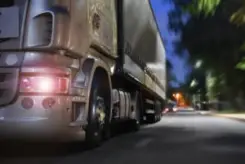
When you suffer an injury in an accident with a commercial truck, you might pursue damages through a personal injury lawsuit. However, going to court after a trucking accident may seem overwhelming while you recover from your injuries.
Understanding the legal process and how to protect your legal rights after a truck collision gives you the best chance for a positive outcome. A truck accident attorney can help.
Do All Trucking Accident Cases Go to Court?
Not all trucking accident cases end up in court. In fact, many personal injury claims settle before trial. However, it is still in your interest to file a lawsuit within the statute of limitations. Every state has a different time frame to file personal injury claims. Depending on your accident’s circumstances, the deadline can vary.
If you fail to file your truck accident lawsuit within your state’s statute of limitations, you could lose the chance for compensation. However, a skilled trucking accident lawyer can explain your rights and help you through the legal process, so you don’t miss this critical deadline.
For a free legal consultation, call (404) 888-8888
Truck Accidents FAQs
What Damages Can I Recover in a Truck Accident Claim in Atlanta?What Steps Should I Take After a Cargo Truck Accident in Atlanta?What are Common Causes of Truck Accidents in Alpharetta?How Can a Decatur Truck Accident Lawyer Prove Liability?Do I Need a Truck Accident Lawyer?How Crucial Is Evidence Gathering in a Smyrna Truck Accident Case?What Is the Legal Process Following a Trucking Accident?
After you sustain an injury in an accident with a semi-truck or tractor-trailer, you can take steps to protect your legal rights and seek compensation. The typical legal process for a truck accident case includes these steps.
Seeking Medical Attention for Your Truck Accident Injuries
Before you take any other steps, ensure that you and anyone else involved in the accident are out of harm’s way. Call 911 or seek emergency medical care immediately if your injuries are severe. Then, visit your doctor within 24-48 hours of the accident—even if your injuries seem minor.
Documenting the Trucking Accident Scene
If you can, document the accident scene by taking photos and videos of the truck and other vehicles involved. In addition, be sure to highlight where the vehicles stopped, their final resting positions, and the damage they sustained. Finally, photograph any skid marks or damage to surrounding objects like guard rails, sign posts, and construction markers.
Determining Who Was At Fault
To sue someone for your trucking accident injuries, you must prove they were at fault. This process may require evidence such as photos, videos, accident reconstruction, and witness statements that shows the other party was reckless, careless, or otherwise negligent.
Submitting a Demand for Your Truck Accident Losses
Once you’ve determined responsibility for your trucking accident injuries, your attorney prepares a demand letter. This demand letter acts as the starting point for your case. It requests payment for the full value of your losses, outlines your account of the accident, and gives the other party a response deadline.
The other party may accept, deny, or counteroffer by the proposed deadline. Your attorney will begin filing the lawsuit if they fail to respond by the deadline.
Filing a Trucking Accident Injury Lawsuit
During negotiations, your lawyer may still file a personal injury lawsuit against the responsible party—especially if the statute of limitations is close to expiring. Talks may yield an out-of-court settlement, but a lawsuit can motivate the insurance company to offer more reasonable terms to avoid trial costs.
Going to Court for Your Trucking Accident
If negotiations don’t succeed, your trucking accident case proceeds to trial. At this point, you should consider hiring an attorney if you have not already. The civil trial process is complicated and typically involves the following steps:
- Filing the lawsuit: Your attorney files an official complaint with the court on your behalf. They serve a copy of the complaint to the parties responsible for your truck accident.
- Discovery: Both sides exchange information, including evidence and witness contact information. They may also ask for depositions from you, witnesses, and experts.
- Motions: As they review the evidence, both sides can submit requests (called motions) to the court for certain procedural or evidentiary rulings.
- Trial: The judge or jury reviews the evidence and listens to both sides’ testimony.
- Closing: Once the court hears all the evidence, both sides provide a closing argument.
- Ruling and damage award: The judge or jury will determine whether the responsible party owes you for damages and how much those damages should be.
Even after the trial begins, both sides can agree to a settlement at any time. Therefore, your truck accident lawyer can continue negotiating with the responsible party and their insurance company to seek maximum compensation for your damages.
What Damages Can I Claim in a Trucking Accident Lawsuit?
The primary goal of a trucking accident claim is to secure monetary compensation for the injuries you suffered because of someone’s negligence. Damages you can seek vary depending on how badly you were injured and how long it takes to recover.
Damages you can claim after a trucking accident may include:
- Lost income
- Medical expenses
- Pain and suffering
- Emotional anguish
Complete a Free Case Evaluation form now
Do I Need an Attorney if I’m Going to Court After a Trucking Accident?
Many states allow you to go to court after a trucking accident without an attorney. However, that doesn’t mean it is in your best interests. A lawyer who regularly handles trucking accidents can guide you through the legal process and represent your rights during negotiations and trial proceedings.
Before going to court after a trucking accident, contact the attorneys at Bader Scott Injury Lawyers to discuss your legal rights and options. During a free consultation, one of our truck accident lawyers can help you understand the court process and your rights.
Call or text (404) 888-8888 or complete a Free Case Evaluation form

